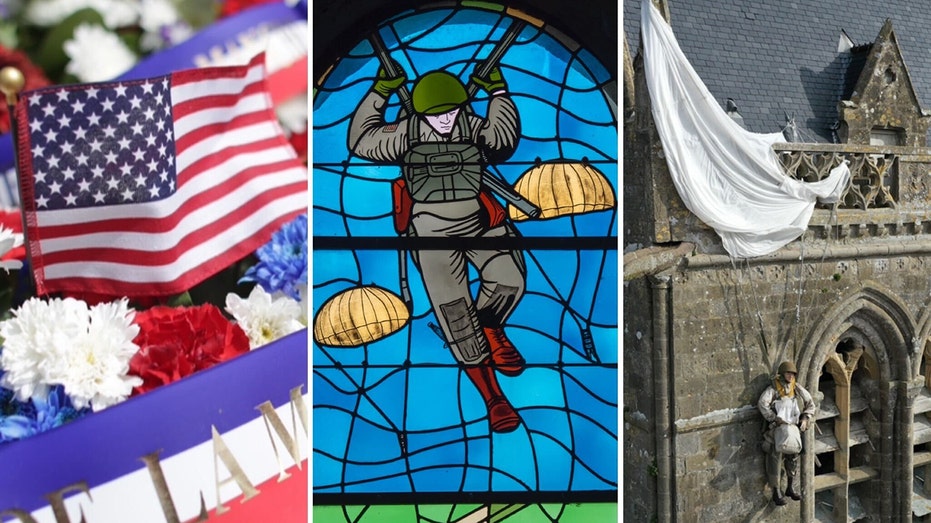The American paratroopers who dropped from the sky into Normandy, France on June 6, 1944, appeared sent from heaven.
In the eyes of the people looking up from the ground of occupied France on D-Day, the climactic event of World War II, they were indeed saviors.
“For me, when they landed, they were like heroes in a movie,” Paul Renaud, a 14-year-old resident of the Norman town of Sainte Mere Eglise on D-Day, said years later, in a story reported on the U.S. Army website.
ANNE FRANK’S SPIRITS SOARED ON D-DAY: ‘FRIENDS ARE ON THE WAY,’ SHE WROTE OF HEROIC GIs
American youth crossed the Atlantic Ocean to deliver France from evil — the evil of Adolf Hitler’s National Socialist German Workers Party.
Later, Renaud helped the grateful people of Normandy testify to their belief in biblical deliverance in stained-glass art.
Colorful images of America’s airborne saviors decorate the churches of Normandy in a powerful statement of gratitude.
The honor of a church stained-glass tribute is normally reserved, in any nation, to celebrate the deliverance of Jesus Christ.
Sainte Mere Eglise was the first French town liberated by U.S. Army paratroopers on D-Day — and it’s the center of 80th anniversary celebrations this week.
An effigy of an American paratrooper hangs in perpetuity from the steeple of the church in the town square.
It’s an ongoing tribute to Pvt. John Steele, an airborne soldier who was shot when his chute got caught on the church steeple. He somehow survived the night of nights hanging in that position.
Inside the church, one stained-glass window shows three paratroopers in Army green and combat gear falling from the sky.
A closer look reveals an entire force of airborne saviors descending around and behind them.
Dozens of parachutes in the background fall to the ground, as Mother Mary and Baby Jesus watch over and protect them from above.
Renaud was still just a teen when he sketched his vision for the window at the end of the war in 1945, according to the U.S. Army report. Artisan Gabriel Loire crafted it in the village of Chartres.
The human drama of deliverance in Sainte Mere Eglise was immortalized in the book “The Longest Day” by Irish journalist Cornelius Ryan.
His landmark history of D-Day was later turned into a star-studded Hollywood epic of the same name.
A large building in the town square was consumed by fire that night after it was hit by a stray bomb.
The residents of Sainte Mere Eglise formed a bucket brigade late at night to battle the blaze.
Soldiers from the German army garrison occupying the town were out with them, too.
At that moment, the light of the fire revealed parachutes falling from the sky.
The first American battle of D-Day was underway.
Some paratroopers were shot dead by the Germans before they landed. At least one GI burned to death falling into the town hall fire.
The paratroopers soon overwhelmed the Germans, giving the U.S. airborne its first victory in a deadly campaign to follow.
Their heroic story was well-known when the surviving liberators returned to Sainte Mere Eglise for the 25th anniversary of D-Day on June 6, 1969.
Another stained-glass window was installed in the church to celebrate the event.
WORLD WAR II’S D-DAY: PHOTOS REVEAL WORLD’S LARGEST AMPHIBIOUS INVASION
“They have come back,” reads one panel in both English and French.
The artwork includes profound symbolism to honor the human saviors of Sainte Mere Eglise upon their return.
Saint Michael the Archangel, in Catholic tradition, leads the army of God in its constant battle against evil. He stands at the center of the 25th anniversary stained-glass window.
Saint Michael is armed for battle in the image with shield, helmet and sword.
Among other duties, he also delivers the souls of the dead to heaven — including those of the GIs who could return only in spirit and memory for the 25th anniversary of the liberation of Sainte Mere Eglise.
The church in the nearby village of Angoville au Plain pays homage to American paratroopers in two pieces of decorative glass.
One was placed in the church in 2004 for the 60th anniversary of D-Day. Its clean and clear design shows three paratroopers descending into the town.
Two great symbols of the United States, the bald eagle and the Statue of Liberty, highlight another stained-glass window, with parachutes of the American liberators descending around their national icons.
The names of U.S. Army medics Kenneth Moore and Robert Wright appear at the bottom of the window.
Red crosses, the symbol of caregivers on both sides of the war, run up and down the edges of the window.
CLICK HERE TO SIGN UP FOR OUR LIFESTYLE NEWSLETTER
The paratroopers jumped into Normandy on D-Day and turned the tiny church of Angoville au Plain into a mini-hospital for the wounded and the dying.
Moore and Wright saved fellow paratroopers and the seaborne infantry that landed on the beach and made their way inland later on June 6. The medics earned international acclaim by providing aid to German soldiers, too.
Heroes of both the United States and France, Moore and Wright won the hearts of local residents when they cared for wounded civilian girls caught in the crossfire of D-Day and in the days of fighting that followed.
The church houses other testaments to the horror and heroism of D-Day, beyond stained-glass.
For more Lifestyle articles, visit www.foxnews.com/lifestyle
Some of its pews are still stained with blood that spilled onto the makeshift hospital beds on “The Longest Day.”
Article Source: Travel From Fox News Read More




